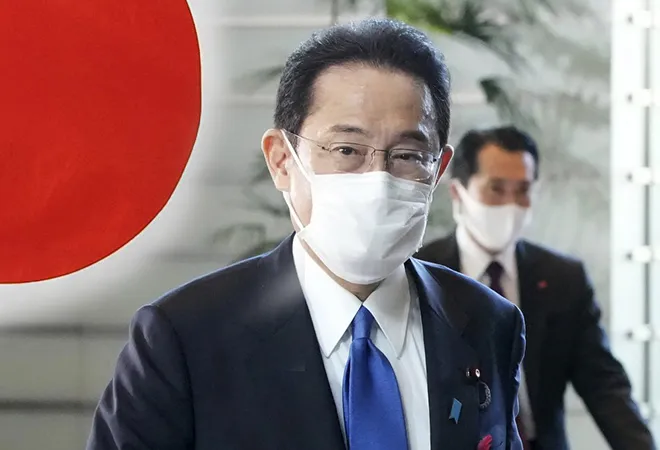-
CENTRES
Progammes & Centres
Location
Fumio Kishida’s victory owes much to LDP’s conservative wing and many of his foreign policy actions will function within the parameters that former prime minister Shinzo Abe laid down during his time in office

The votes are in and the wait is over: Fumio Kishida will be anointed Prime Minister of Japan. His victory, just a year after an ignominious defeat at the hands of outgoing premier Yoshihide Suga, comes at a time of churn and crisis. Kishida will have his hands full from Day 1: the COVID-19 pandemic still rages, Japan’s economic recovery and an ambitious China knocking on Japan’s doorstep.
Just over a year ago, former Foreign and Defence Minister Kishida found himself on the other side of the political equation. As Shinzo Abe demitted office, Kishida ran to replace him and lost handily to Abe’s right-hand man Yoshihide Suga, who went on to take the top job. Many felt that the 62-year old Kishida, who represents Hiroshima in the House of Representatives, had his chance and squandered it. Luckily for Kishida, Suga did not prove nearly as adept at being prime minister as he had at being Shinzo Abe’s political fixer. His administration was widely seen to have mishandled Japan’s response to COVID-19 by delaying vaccine rollouts and proposing half-baked travel schemes as cases raged. Suga’s domestic approval rating sank and Japan’s ruling Liberal Democratic Party (LDP) grew increasingly jittery about entering an impending general election with the embattled prime minister as its leader. Sensing his chance, Fumio Kishida declared his candidacy for the LDP leadership and helped hasten the process of pushing Suga out.
Kishida shed his image as a dove on China by expressing “deep alarm” over the East Asian power’s actions in the South China Sea.
However, to get the top job, Kishida still had to best a host of competitive candidates. Taro Kono, son of powerful former Speaker of the Diet Yohei Kono, is a former foreign and defence minister and is among the most popular serving politicians in Japan. His reputation as a maverick reformer shored up his support among rank and file LDP members who wanted a bold approach to Japan’s wide-ranging economic, political and problems. However, his penchant for defying the party line on key issues like nuclear power (Kono opposed it), hurt his chances among senior elected members. Then there was Sanae Takaichi, the darling of Japan’s right-wing. More than any other candidate, Takaichi was the breakout star of this leadership election and won praise for her articulation and confidence in candidate debates. Takaichi also received former prime minister Shino Abe’s backing who continues to control the LDP’s conservative faction.
Nevertheless, Kishida was able to see off his competition. His status as an inoffensive “safe pair of hands” and long experience in government proved attractive to more senior members of the party. During this leadership campaign, Kishida shed his image as a dove on China by expressing “deep alarm” over the East Asian power’s actions in the South China Sea. He also shied away from endorsing controversial social positions like same-sex marriage. In doing so, Kishida signalled that he was willing to compromise on key issues to suit Japan’s conservatives. Abe and his tribe took notice and threw their weight behind Kishida who handily beat Taro Kono in the runoff election.
For India and Japan’s other partners globally, stability will key. Policymakers in South Block will doubtless sleep a little easier knowing that Shinzo Abe has made a decisive return to politics, even if in a less prominent role. The longtime prime minister was a key advocate for a closer India-Japan relationship which accelerated post-2014. Abe was a notable China hawk before it became fashionable and actively pushed world leaders to establish initiatives like the Quad.
Kishida’s victory owes much to LDP’s conservative wing and many of his foreign policy actions will function within the parameters that Abe laid down during his time in office. Kishida has not only criticised China’s economic and political aggression during his time as a candidate but also proclaimed his willingness to work with “those that share the same values, such as the US, Europe, India and Australia”. Significantly, Kishida has also indicated his support for Japan’s acquisition of an offensive missile strike capability. By acquiring an avowedly offensive tool of war, Japan will make clear to both allies and competitors that its more muscular military posture is here to stay.
Kishida shed his image as a dove on China by expressing “deep alarm” over the East Asian power’s actions in the South China Sea.
Kishida has also stated that establishing economic security will be a key priority for his administration. This drive to reduce dependence on China and diversify key supply chains, combined with Quad’s plan to establish supply chain resilience in semiconductors, represents a key opportunity for India. As tensions with China mounted and the COVID-19 pandemic raged, Japan offered compensation for a range of Japanese companies to move out of China and into friendlier climes in Southeast Asia and India. With some creative diplomacy and internal economic improvements, New Delhi can convince Tokyo to take the bilateral economic relationship to the next level. On the international stage, New Delhi will have to count on Japan to hold the fort on key economic standards in trade compacts like RCEP and CPTPP given that India and the United States are not involved. Kishida is already feeling the heat in his new role given China’s recent application to join the CPTPP.
However, India will still regard some key issues with concern. For one, Tokyo’s troubled relationship with South Korea, another valued Indian partner, is likely to remain fraught for the foreseeable future. The relationship turned sour in 2018 over the contentious issue of World War II reparations and has since spiralled into a tech war and high-level diplomatic freeze. While a presidential election is due in South Korea in March and may bring fresh diplomatic overtures, Kishida’s victory means a victory for Japan’s Korea-sceptical conservatives who will not be eager to give any ground. With key military intelligence pacts, economic security challenges and a powerful China in the neighbourhood, New Delhi can only counsel the obvious.
As tensions with China mounted and the COVID-19 pandemic raged, Japan offered compensation for a range of Japanese companies to move out of China and into friendlier climes in Southeast Asia and India.
Finally, New Delhi will also watch the upcoming Japanese general election closely. While the ruling LDP faces no serious challengers, the public made its displeasure with the previous Suga administration clear. The LDP is gambling that a new Prime Minister in his honeymoon period will turn the tide. Should Kishida suffer a reverse at the polls, his position will undoubtedly suffer. The last thing New Delhi wants is a string of politically weak Prime Ministers that will be unable to walk the talk on foreign policy and economic commitments.
As Kishida fulfils his ambition of a lifetime and steps into the Kantei, he will have his hands full.
This commentary originally appeared in First Post.
The views expressed above belong to the author(s). ORF research and analyses now available on Telegram! Click here to access our curated content — blogs, longforms and interviews.

Shashank Mattoo was a Junior Fellow with the ORFs Strategic Studies Program. His research focuses on North-East Asian security and foreign policy.
Read More +